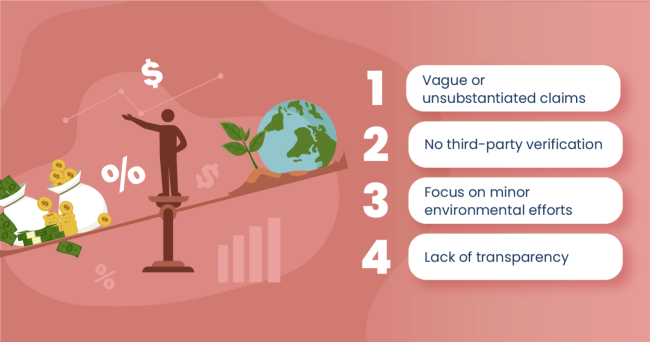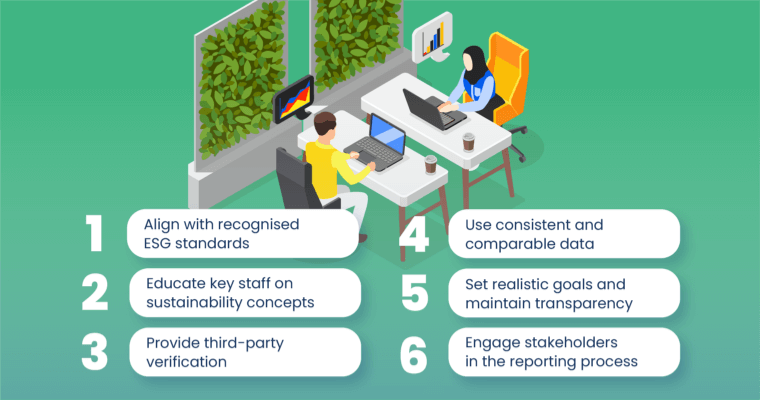There is no doubt that sustainability has been pushed into the spotlight over the last few years. That said, between investors and consumers, offering a “good” product or service is no longer enough to attract attention.
Now, various stakeholders increasingly seek options that align with their environmental, social, and governance (ESG) values. This has led to an increase in demand for sustainable funds. In fact, interest in these ESG-focused funds more than doubled within a year, reaching a record-high of $51 billion. Likewise, 58% of consumers across generations are willing to pay a premium for products and services that promote sustainability.
This rise, unsurprisingly, has spiked the instances of companies engaging in deceptive practices. Organisations have been caught red-handed creating false sustainability claims to take advantage of the growing interest in ESG. Known as “greenwashing,” this practice exploits the fanfare over sustainability and the current lack of globally recognised standards in the ESG sector.
This article explores the mechanisms, pitfalls, global regulations, and examples of greenwashing. It offers valuable insights into how companies and investors can navigate the complexities of ESG claims.
What is greenwashing?

Greenwashing is the practice of portraying a product, service, or investment option as more ethical or sustainable than it truly is.
Organisations that use this tactic prioritise the appearance of sustainability over meaningful action. This has become almost an epidemic in the ESG space — where companies may exaggerate or misrepresent their efforts to satisfy investor preference and meet regulatory requirements for responsible business practices.
Several key factors drive companies toward greenwashing:
- Profit over meaningful action: As the demand for environmentally responsible goods and services grows, companies are more than eager to capture the attention and capital of ESG-minded investors. The potential profit from this sector can lead companies to overstate their sustainability initiatives to appeal to this market segment.
- Greenwashing as a marketing strategy: By portraying a sustainable, conscious persona, businesses aim to build goodwill and foster loyalty among consumers who value ESG principles, even if their actual sustainability efforts are minimal.
- Data manipulation for compliance: There is an incentive for companies to manipulate data or mislead stakeholders to maintain compliance with global governing bodies. Inaccurate or selective reporting on ESG performance undermines the credibility of the sector and can lead to significant long-term reputational damage.
Examples of Greenwashing: Frequently Used Tactics
Greenwashing often takes advantage of the public’s enthusiasm for addressing critical global issues like climate change and reducing carbon emissions.
Here are some common tactics used by companies:
- Overstated Marketing Campaigns: One of the simplest ways companies practise greenwashing is by exaggerating the sustainability efforts that they implement across their operations. In this case, organisations have ESG-related initiatives, but their focus is more towards virtue signalling and promoting the negligible effect they have on the cause instead of investing in actual results.
For instance, a global fashion and design company is marketed as a bid for the brand that is infamously fast fashion towards sustainability. Through an investigation, it was revealed that their claims at best had minimal effects, but overall it was vague and lacked transparency.
The result was consumer backlash, with customers feeling misled. Instead of successfully jumping onto the sustainability bandwagon, their efforts led to a further decline in the brand’s credibility. - Misleading Terminology: Terms like “carbon-neutral” or “environmentally friendly” are frequently used without legal or scientific backing. These phrases are used solely for marketing purposes and are designed to attract ESG-conscious consumers and investors. These terms often lack the substance to support real impact.
In 2022, the international self-regulatory governing body of association football, beach soccer, and futsal announced that the upcoming World Cup would be a carbon-neutral event. By purchasing “carbon offsets,” the organisation intends to counteract the generated carbon emissions during the entire tournament.
Following the events, the Swiss Fairness Commission ruled that the organisation made false claims. The organisation severely underestimated its emissions – ultimately not enough to offset what the games generated. This has led to the development of stricter guidelines in using terms such as “carbon neutral”, “net-zero” and “carbon negative”. - Greenhushing: Some companies avoid disclosing their sustainability data altogether. This is a practice known as “greenhushing.” Greenhushing is often used out of fear that efforts won’t meet stakeholder expectations. By withholding data, or cherry-picking released information, it is designed to prevent the proper analysis and verification of ESG claims.
In 2022, a British universal bank and financial services group was accused of greenhushing when it quietly downgraded a few of its Article 9 funds into Article 8. For context, Article 9 funds are exclusively sustainable assets, while Article 8 funds are “funds that promote environmental or social factors but do not need to target a sustainable outcome.”
This is a significant shift because the banking giant announced in 2022 that they are cutting support for oil and gas projects. However, they backpedalled on these efforts last year by downgrading the assets they support. According to the company, their decision comes with the EU’s decision to implement stricter ESG guidelines. Despite the changes, the banking institution assures the general public that they will remain steadfast in their sustainability objectives. - Greenwishing: In some cases, greenwashing is unintentional. Companies set overly ambitious sustainability goals without the resources or commitment to achieve them. Even with the best intentions, failure to meet these targets can result in broken trust with investors and damage to a company’s ESG reputation.
During the most recent COP26 in 2021, six global automotive companies signed a climate pledge to cease the construction of diesel and petrol vehicles by 2040. While the goal is great, it is highly unlikely that these automobiles will be faced out in under two decades.
The Impact of Greenwashing on Companies
Greenwashing can have severe, long-term consequences that may lead to financial losses, regulatory issues, and damage to its reputation:
- Loss of consumer trust
When a company misleads consumers with false sustainability claims, it can affect customer trust. After all, once trust is lost, it becomes difficult to rebuild. Stakeholders may feel betrayed and less likely to engage with the brand in the future, leading to declines in sales and loyalty. - Regulatory penalties
As governments introduce stricter environmental laws, greenwashed companies can face significant fines and penalties. Regulatory bodies are now more focused on holding businesses accountable for false claims about sustainability. - Reputational damage
A company’s reputation can be irreparably harmed if it is exposed to greenwashing. Media outlets, environmental organisations, and consumers may criticise the business, resulting in a loss of goodwill and future business opportunities. - Diminished shareholder value
When a company is exposed to greenwashing, its stock prices often suffer as investors lose confidence. Shareholders may divest, and the company may find it harder to attract future investors. - Increased scrutiny from stakeholders
Once a company is caught greenwashing, it often faces ongoing scrutiny from regulators, environmental groups, and the media. This increased oversight can lead to higher compliance costs and greater pressure to deliver authentic results.
4 Signs of Corporate Greenwashing

For both consumers and investors, spotting greenwashing can be challenging. Thankfully, there are a few key indicators that make these practices easier to recognize:
- Vague or unsubstantiated claims
One of the easiest ways to recognize greenwashing is by looking for vague language. Terms like “eco-friendly,” “natural,” or “carbon-neutral” without any specific, measurable data to back them up are often a red flag. Many companies use these phrases without providing concrete details about their sustainability practices, using them solely as part of their marketing efforts. - No third-party verification
Legitimate sustainability practices are often created with the use of relevant ESG software and certified by third-party organisations. Certifications such as Fair Trade, B Corp, LEED, and Carbon Trust help validate a company’s claims. If a company’s sustainability efforts are not backed by any independent verification, it could be a sign of greenwashing. - Focus on minor environmental efforts
Greenwashed companies emphasise small, easily achievable changes while ignoring larger, more impactful environmental issues. Otherwise known as “green sheen,” this diverts attention from the bigger picture, focusing on small wins rather than substantial change. - Lack of transparency
Transparency is key to assessing sustainability efforts. Companies that do not provide clear, detailed information about their environmental practices are often hiding the true extent of their efforts — or lack thereof. Transparent businesses are open about both their achievements and challenges.
Local Regulations Combatting Greenwashing
Around the world, governments and regulatory bodies are enacting policies to combat greenwashing and hold companies accountable for their sustainability claims:
North America
- US Federal Trade Commission (FTC) Green Guides
The FTC’s “Green Guides” offer guidance to help businesses avoid making misleading environmental claims. These guidelines encourage companies to be specific about their sustainability efforts, discouraging vague or deceptive terms like “green” or “eco-friendly” without substantial evidence. While the guides themselves do not impose penalties, companies caught violating these principles may face fines or legal actions for false advertising. - Canada’s Competition Bureau
The Competition Bureau enforces the Competition Act, which prohibits deceptive marketing practices, including greenwashing. Companies making environmental claims must provide evidence to support their assertions, or risk facing fines or litigation.
Europe
- European Union (EU) Corporate Sustainability Reporting Directive (CSRD)
The EU has taken significant steps toward enhancing transparency and accountability in corporate sustainability practices. The CSRD, effective from 2023, mandates that companies disclose more detailed information about their sustainability efforts. This directive ensures that companies report accurate and measurable data related to their environmental impact, helping to prevent greenwashing by setting standards for sustainability reporting. - France’s Anti-Waste Law
France has enacted stringent regulations to curb greenwashing, requiring companies to provide clear, verifiable environmental claims. Through their anti-waste law, they’ve mandated companies to be transparent about the carbon footprint of their products and services. Misleading environmental claims are now subject to penalties under French consumer law.
Latin America
- Brazil’s Consumer Defense Code
Brazil has one of the strongest consumer protection frameworks in Latin America. Under the Consumer Defense Code, businesses making false or misleading environmental claims can be fined, sued, or face other legal consequences. This law applies to greenwashing, ensuring that companies provide truthful and accurate information about their sustainability practices.
Asia-Pacific Region
- Singapore’s Circular No. CFC 02/2022
In January 2023, Singapore implemented Circular No. CFC 02/2022, laying out various guidelines on what should be followed by ESG funds. The new requirements include guidance on how to name a fund, the key information that needs to be disclosed relating to ESG, and an annual report requirement disclosing the extent of the fund’s ESG focus. - Hong Kong’s 2021 Circular
Hong Kong Securities and Futures Commission recently took steps toward implementing regulations against greenwashing. They issued a circular that aims to help investors identify trusts and mutual funds that are ESG-focused. By establishing guidelines for disclosures, investment strategies, and compliance, interested stakeholders can identify assets that have misleading and greenwashed sustainability claims.
Strategies to Prevent Greenwashing Accusations for Companies

One corporate greenwashing accusation can take a significant toll on a company’s reputation, financial stability, and relationship with stakeholders.
While crucial, accurate ESG reporting remains challenging. Between the growing pressures of stakeholder priorities and the ever-changing compliance regulations, there is a lot of pressure on companies to emphasise their ESG success and downplay their misgivings.
Striking a balance between attracting potential investors and upholding transparency on sustainable practices is challenging. Thankfully, there are steps a company can take to ensure that they don’t misinterpret their data:
- Align with recognised ESG standards
Established frameworks such as the Global Reporting Initiative (GRI), Sustainability Accounting Standards Board (SASB), and the Task Force on Climate-related Financial Disclosures (TCFD) are valuable resources that companies can use to accurately represent their ESG efforts. These frameworks provide clear guidelines on what to report and how to report it. By using these standards, companies can present their ESG data credibly. - Educate key staff on sustainability concepts
When it comes to communicating efforts, marketing teams should be aligned with sustainability concepts and risks . Accuracy and transparency should be at the forefront of messaging to prevent any accusations of greenwashing. - Provide third-party verification
ESG reports should be verified by independent third parties, such as auditing firms or certification bodies. This verification process helps ensure that the information provided is accurate and free from bias. Third-party verification adds credibility to a company’s ESG disclosures and reduces the risk of being accused of ESG greenwashing. - Use consistent and comparable data
No company is perfect, but pursuing sustainability is not a one-off project. Using comparable data over time allows stakeholders to track progress and ensure that improvements (or setbacks) are measured against a reliable baseline. Sustainability tools like ESG software, keep stakeholders informed and showcase long-term dedication to sustainable growth. - Set realistic goals and maintain transparency
General claims about environmental initiatives are often seen as red flags for greenwashed operations. After all, it can be difficult to track progress if goals are subjective. Instead, to avoid risks of greenwashing, companies should be specific about their ESG efforts, explaining what actions they are taking, how these align with broader goals, and what results they are achieving. - Engage stakeholders in the reporting process
Involving stakeholders like employees, investors, and customers in the ESG reporting process can improve transparency. Stakeholders can provide valuable feedback, identify areas for improvement, and help validate the company’s sustainability claims. Engaging stakeholders fosters trust and collaboration while reducing the likelihood of greenwashing accusations.
FAQs
- What does greenwashing mean in sustainable investing?
Greenwashing in sustainable investing refers to the practice of misleading investors by exaggerating or fabricating the environmental benefits of a product, service, or investment. Companies may promote themselves as more sustainable than they actually are to attract ESG-focused investors, ultimately undermining the integrity of sustainable investing. - What is greenwashing in ESG funds?
In the context of ESG funds, greenwashing occurs when funds misrepresent their investment strategies or the sustainability of their holdings. This can come in various forms including exaggerating the environmental or social impact of investments, using vague or misleading language, or including companies that do not meet true sustainability criteria. - What is the importance of ESG for investors?
ESG factors are increasingly important for investors as they provide insights into a company’s long-term sustainability, risk management, and potential for profitability. Companies with strong ESG practices are often better positioned to navigate regulatory changes, attract customers, and enhance brand loyalty, which can lead to more stable financial returns. Investors are also motivated by a desire to align their investments with their values and contribute positively to societal and environmental outcomes. - How can investors check sustainability claims and identify greenwashing?
Investors can check sustainability claims by scrutinising corporate sustainability reports and looking for specific, measurable outcomes rather than vague assertions. Third-party certifications provide a level of assurance regarding claims, so seeking these can be helpful. Using tools like sustainability rating platforms and data analysis software can aid in evaluating companies’ actual practices. Additionally, investors should be aware of common greenwashing tactics, such as overly promotional marketing campaigns or a lack of transparency regarding sustainability efforts.

Ensuring Transparent ESG Reporting with Convene ESG
As instances of greenwashing become more prevalent, businesses face increasing pressure to back their sustainability claims with concrete, accurate data. To avoid reputational and financial setbacks, companies must embrace transparency, align with recognised frameworks, and ensure their sustainability efforts are genuine and measurable.
Convene ESG is an ESG reporting software that offers a powerful solution for tracking, analysing, and reporting on metrics with precision. With its real-time data collection, customisable dashboards, and seamless integration capabilities, the platform simplifies compliance and enhances your organisation’s ESG performance.
Book a demo today to discover how Convene ESG can help your company maintain transparency and stay ahead in the evolving world of sustainable business.














